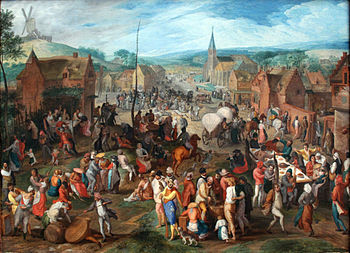Portal:Business
The Business and Economics Portal Business is the practice of making one's living or making money by producing or buying and selling products (such as goods and services). It is also "any activity or enterprise entered into for profit." A business entity is not necessarily separate from the owner and the creditors can hold the owner liable for debts the business has acquired. The taxation system for businesses is different from that of the corporates. A business structure does not allow for corporate tax rates. The proprietor is personally taxed on all income from the business. A distinction is made in law and public offices between the term business and a company such as a corporation or cooperative. Colloquially, the terms are used interchangeably. (Full article...) Economics (/ˌɛkəˈnɒmɪks, ˌiːkə-/) is a social science that studies the production, distribution, and consumption of goods and services. Economics focuses on the behaviour and interactions of economic agents and how economies work. Microeconomics analyses what is viewed as basic elements in the economy, including individual agents and markets, their interactions, and the outcomes of interactions. Individual agents may include, for example, households, firms, buyers, and sellers. Macroeconomics analyses the economy as a system where production, distribution, consumption, savings, and investment expenditure interact, and factors affecting it: factors of production, such as labour, capital, land, and enterprise, inflation, economic growth, and public policies that have impact on these elements. (Full article...) Selected articleWilliam Barley (1565?–1614) was an English bookseller and publisher. He completed an apprenticeship as a draper in 1587, but was soon working in the London book trade. As a freeman of the Drapers' Company, he was embroiled in a dispute between it and the Stationers' Company over the rights of drapers to function as publishers and booksellers. He found himself in legal tangles throughout his life. Selected image
Selected economyThe economy of Brazil is historically the largest in Latin America and the Southern Hemisphere in nominal terms. The Brazilian economy is the second largest in the Americas. It is an upper-middle income developing mixed economy. In 2024, according to International Monetary Fund (IMF), Brazil has the 8th largest gross domestic product (GDP) in the world and has the 8th largest purchasing power parity in the world. In 2024, according to Forbes, Brazil was the 7th largest country in the world by number of billionaires. According to International Monetary Fund (IMF), Brazilian nominal GDP was US$2.331 trillion, the country has a long history of being among the largest economies in the world and the GDP per capita was US$11,178 per inhabitant. The country is rich in natural resources. From 2000 to 2012, Brazil was one of the fastest-growing major economies in the world, with an average annual GDP growth rate of over 5%. Its GDP surpassed that of the United Kingdom in 2012, temporarily making Brazil the world's sixth-largest economy. However, Brazil's economic growth decelerated in 2013 and the country entered a recession in 2014. The economy started to recover in 2017, with a 1% growth in the first quarter, followed by a 0.3% growth in second quarter compared to the same period of the previous year. It officially exited the recession. (Full article...) Selected quoteHeroism and the respect it commands is a form of compensation by society for those who take risks for others. And entrepreneurship is a risky and heroic activity, necessary for growth or even the mere survival of the economy. It is also necessarily collective on epistemological grounds-to facilitate the development of expertise. Someone who did not find something is providing others with knowledge, the best knowledge, that of absence (what does not work)-yet he gets little or no credit for it. He is a central part of the process with incentives going to others and, what is worse, gets no respect. I am an ingrate toward the man whose overconfidence caused him to open a restaurant and fail, enjoying my nice meal while he is probably eating canned tuna. In order to progress, modern society should be treating ruined entrepreneurs in the same way we honor dead soldiers, perhaps not with as much honor, but using exactly the same logic (the entrepreneur is still alive, thought perhaps morally broken and socially stigmatized, particularly if he lives in Japan.) For there is no such thing as a failed soldier, dead or alive (unless he acted in a cowardly manner)-likewise, there is no such thing as a failed entrepreneur or failed scientific researcher, any more than there is a successful babbler, philosophaster, commentator, consultant, lobbyist, or business school professor who does not take personals risks. (Sorry.) Psychologists label "overconfidence" a disease, blinding people to the odds of success when engaging in ventures. But there is a difference between benign, heroic type of risk taking that is beneficial to others, in the antifragile case and the nastier modern type related to negative Black Swans, such as the overconfidence of "scientists" computing the risks of harm from the Fukushima reactor. In the case of the former, what they call overconfidence is a good thing, not something to medicate.
TopicsRelated WikiProjectsDid you know (auto-generated) -
On this day in business history
General imagesThe following are images from various business-related articles on Wikipedia.
More did you know
Business news Wikinews Economy and business portal
|







































